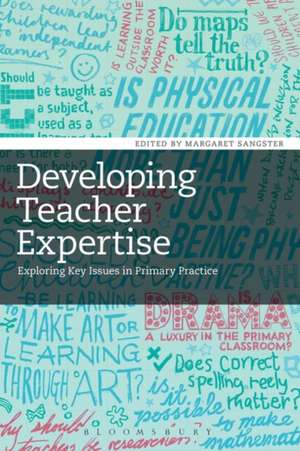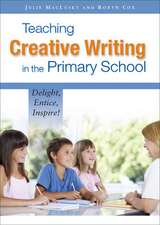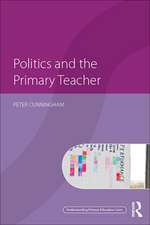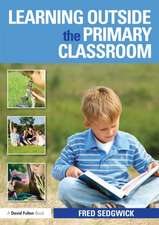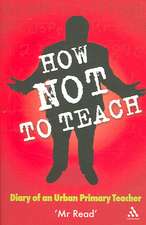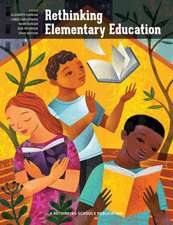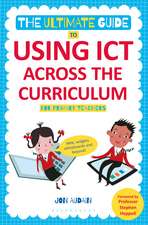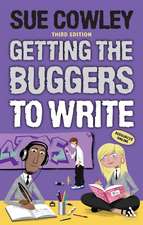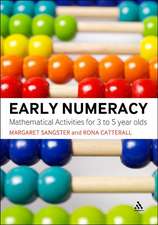Developing Teacher Expertise: Exploring Key Issues in Primary Practice
Editat de Margaret Sangsteren Limba Engleză Paperback – 5 dec 2012
| Toate formatele și edițiile | Preț | Express |
|---|---|---|
| Paperback (1) | 256.12 lei 6-8 săpt. | |
| Bloomsbury Publishing – 5 dec 2012 | 256.12 lei 6-8 săpt. | |
| Hardback (1) | 947.11 lei 6-8 săpt. | |
| Bloomsbury Publishing – 5 dec 2012 | 947.11 lei 6-8 săpt. |
Preț: 256.12 lei
Preț vechi: 294.68 lei
-13% Nou
Puncte Express: 384
Preț estimativ în valută:
49.01€ • 51.17$ • 40.47£
49.01€ • 51.17$ • 40.47£
Carte tipărită la comandă
Livrare economică 15-29 aprilie
Preluare comenzi: 021 569.72.76
Specificații
ISBN-13: 9781441179111
ISBN-10: 1441179119
Pagini: 176
Dimensiuni: 156 x 234 x 13 mm
Greutate: 0.3 kg
Ediția:New.
Editura: Bloomsbury Publishing
Colecția Bloomsbury Academic
Locul publicării:London, United Kingdom
ISBN-10: 1441179119
Pagini: 176
Dimensiuni: 156 x 234 x 13 mm
Greutate: 0.3 kg
Ediția:New.
Editura: Bloomsbury Publishing
Colecția Bloomsbury Academic
Locul publicării:London, United Kingdom
Caracteristici
Briefly introduces each issue before encouraging readers to reflect on their practice and position.
Notă biografică
Margaret Sangster was formerly Principal Lecturer and Programme Director of the BA (Hons) in Primary Education at Canterbury Christ Church University, UK. She worked for many years as a primary teacher, and as a mathematics advisory teacher before moving to Higher Education.
Cuprins
List of Contributors \ Preface \ Introduction \ Part I: The Learning Environment \ 1. Do schools work - a challenge to the institutionalization of learning? Rebecca Austin \ 2. When does inclusion become exclusion for the rest of the class? Maggie Evans \ 3. Does differentiation make it easier for children to learn? Jill Matthews \ 4. Why aim to create independent learners? Margaret Sangster \ 5. Why and how can we engage children with their learning? Claire Hewlett \ 6. Can we use the built environment to support children's learning? Jonathan Barnes \ 7. What do we understand from using images in the classroom? Peter Dorman \ 8. Do displays contribute to children's learning? Bridie Price \ 9. Do interactive whiteboards support or reduce creativity in the classroom? Karl Bentley \ 10. Is learning outside the classroom worth it? Michael Green \ 11. What is the value of encouraging talk in your classroom? Jill Matthews \ 12. Does rewarding children lead to independent learners? Margaret Sangster \ Part II: The Curriculum \ 13. Should we be teaching a second language to children under seven? Vikki Schultz and Anthony Clarke \ 14. Is drama a luxury in the primary classroom? Tracy Parvin \ 15. Is there a place for picture fiction with children over seven? Susan Barrett \ 16. Does correct spelling really matter? Caroline Tancock \ 17. Is it possible to make mathematics real and meaningful in the classroom? Jon Wild \ 18. How can questioning to create thoughtful reflection and learning in mathematics? Paula Stone \ 19. Is physical education more than just being physically active? Kristy Howells \ 20. Should ICT be taught as a subject, used as a learning tool, or is there a need for both? Nyree Scott \ 21. Should children be learning to make art or learning through art? Peter Gregory \ Part III: The Wider World \ 22. Why do children and teachers need to develop a multi-cultural and global perspective? Tony Mahon \ 23. What makes stereotypes pernicious? Stephen Scoffham \ 24. Should we teach children about current affairs? Stephen Scoffham \ 25. Maps are increasingly being used by children but do these maps tell the truth? Terry Whyte \ Part IV: Teachers' Professional Status \ 26. What are some philosophical, sociological and psychological perspectives on education? Rosemary Walters \ 27. What is meant by professional identity? Vanessa Young \ 28. What does professionalism mean for a teacher? Peter Dorman \ 29. Why should teachers be researchers? Viv Wilson \ 30. How do we improve our own practice? Viv Wilson \ 31. Why are teachers involved in mentoring and being mentored? Donna Birrell \ Index
Recenzii
Wow! We have needed a book like this in primary initial teacher education for some time. The short, sharp chapters provide excellent 'think-pieces' for tutors to launch into discussions with students to support the development of their teacher identity and philosophy. These are vital areas for student teachers to engage with since security in the knowledge of their own teacher identity and philosophy sustains teachers throughout their careers. The structure of the book provides a holistic conception of teaching and the role of the primary teacher. It provides an opportunity for student teachers to ask searching questions which will develop their understanding beyond the conception that teaching is merely a craft.
The book could be used to invite teachers to reflect about their own practice and to initiate classroom discussions in teacher preparation courses.The simple language used, the synthesis of complex theoretical arguments, and the illustrations of classroom dilemmas make this book useful for introducing complex debates in education to teacher candidates-just when they are beginning to work in classrooms.
The book could be used to invite teachers to reflect about their own practice and to initiate classroom discussions in teacher preparation courses.The simple language used, the synthesis of complex theoretical arguments, and the illustrations of classroom dilemmas make this book useful for introducing complex debates in education to teacher candidates-just when they are beginning to work in classrooms.
